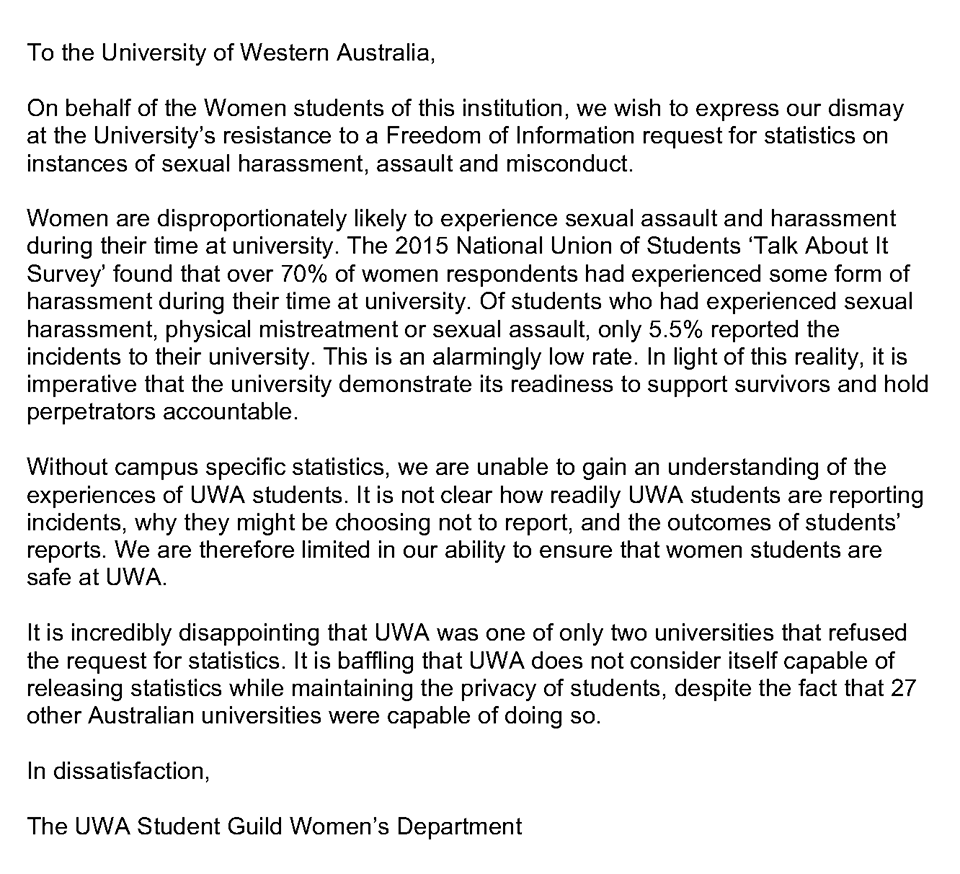UWA has refused to comply with a Freedom of Information investigation report into rape and sexual misconduct into all of Australia’s 39 university campuses, as conducted by Channel 7’s Sunday Night.
Only Monash University joins UWA in its decision not to participate. Several other institutions, such as the University of Melbourne, RMIT and the Australian National University, either denied having received application, or failed to deliver results on time.
Described as “ground-breaking”, the FOI found that a mere six of 575 reported sexual misconduct cases have led to student expulsion.
A spokesperson for the University issued the following response: “The University of Western Australia withheld the information requested under Freedom of Information in order to protect the identities, the personal information and details of investigation processes. This is entirely consistent with freedom of information legislation.”
Vice-Chancellor Paul Johnson also sent an all-staff email this morning, acknowledging that “over the weekend you may have seen some media coverage about sexual assaults on Australian university campuses. This story is an important reminder for us all that sexual assault or harassment of staff, students or visitors on our campuses will not be tolerated.” He did not reference UWA’s (non)role in the investigation.
The UWA Student Guild Women’s Department has subsequently penned an open letter to express their dissatisfaction and “bafflement” with the University’s position. “Without campus specific statistics, we are unable to gain an understanding of the experiences of UWA students,” they write. “It is not clear how readily UWA students are reporting incidents, why they might be choosing not to report, and the outcomes of students’ reports. We are therefore limited in our ability to ensure that women students are safe at UWA.”
“It is incredibly disappointing that UWA was one of only two universities that refused the request for statistics.”
Whilst UWA’s decision may be valid on legislative grounds, students and representatives are today questioning whether it was necessary or indeed, acceptable. Through sensitive pre-treatment of documents – redacting parts which would reveal student identities, for instance – 27 other Australian universities managed to provide Sunday Night basic data on the scale and type of sexual assault occurring on their grounds. The question is begged: what are we hiding? And another: where is our leadership?
“The refusal to participate in the FOI made by Channel 7 is a reflection of the fact that these [non-participating] universities value their public reputation above making a genuine effort to work with the movement to address violence against women,” said NUS Women’s Officer Heidi La Paglia.
“After the efforts that have been made this year to raise awareness of sexual violence, and to bring all universities on board the project to improve policies and institutional responses, it is incredibly disappointing to see that their’s is still an unwillingness to participate in public discourse around the issue.”
The investigation paired with a Channel 7 Sunday Night segment which aired at 8.10 p.m. on Sunday, which featured ex-UWA environmental science student Jannika Jacky, a survivor of rape by a fellow male student. Despite reporting the incident – an initiative which was only suggested to her by a staff member – the alleged perpetrator did not receive heavy penalty, and is known to have continued with his studies. Traumatised, disenchanted and sickened by her perpetrator occupying the same space as her on campus, Jannika herself dropped out not long after the assault. On Sunday’s program, she recalls seeing a photo of her attacker in graduation clothes appearing in her newsfeed earlier this year.
“I was absolutely livid. It seems totally unfair that he gets to do something that I couldn’t really do because of what happened. He gets to graduate and float through university, and float through life totally unhindered by everything that happened,” she told the show’s reporter PJ Madam.
Jannika’s story was also covered by the West Australian on Saturday. However, the article was found to contain victim-blaming statements (such as an emphasis on the fact that Jannika had been drinking on the night of the alleged assault), and was moreover riddled with factual inaccuracies – including the location of the assault, and the course she was studying at the time.
The article was written by West reporter Nick Butterly. It has subsequently been taken down.
On the Sunday Night program, Jannika expressed frustration over UWA’s refusal to disclose information.
“It is definitely a transparency issue and when you don’t have that transparency they also don’t have that accountability for things that have happened,” she said. “I think they should release it. It’s such a huge problem. It’s hugely undiscussed and swept under the rug and I think transparency is absolutely key to improving the way that we ensure the safety of women.”
The FOI investigation coincides with University Australia’s Respect. Now. Always. campaign, which involves a nation-wide survey to gather information on sexual assault and sexual harassment on campus. The study will be the first of its kind in Australia, and – claims UNSW Australia’s Professor Ian Jacobs “appears to be the first in the world where a national university sector has decided to work together on these issues on such a scale.” The report also follows a recent reform of UWA’s own reportage procedure, which was developed with the assistance of UWA Student Guild representatives.
The movement throughout Australia – and indeed, worldwide – is for change. In this instance, rather than choose to proactively assist in shifting the culture and conversation of sexual assault, the stance of the University is closed and defensive. Who are they protecting? Is it victims, survivors and students first? If not, then our UWA is dealing with a big problem of priorities.
Words by Kate Prendergast


